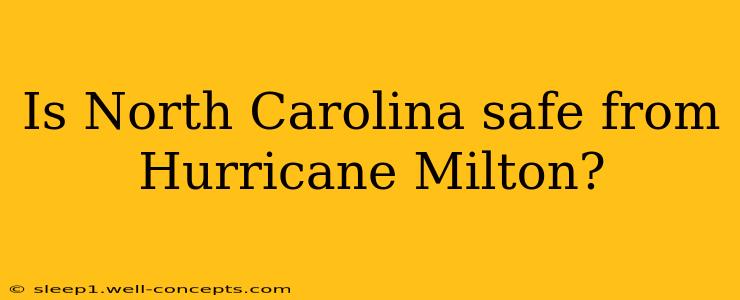The question of whether North Carolina is safe from Hurricane Milton hinges entirely on the hurricane's projected path, intensity, and the specific location within the state. There's no simple yes or no answer. While a hurricane's track can change rapidly, understanding the potential risks is crucial for preparedness.
Understanding Hurricane Milton's Potential Impact on North Carolina
The safety of North Carolina depends on several factors related to Hurricane Milton:
1. Hurricane Track and Intensity:
- The projected path: The National Hurricane Center (NHC) constantly updates its forecast cone, showing the possible path of the hurricane. If the cone includes any part of North Carolina, the state is at risk, even if only a small portion is within the cone's boundaries.
- Hurricane strength: A Category 1 hurricane will cause significantly less damage than a Category 4 hurricane. Wind speeds, storm surge, and rainfall amounts all increase with the hurricane's intensity.
2. Geographic Location within North Carolina:
- Coastal areas: Coastal regions are always at the highest risk from hurricane impacts, including storm surge, high winds, and heavy rainfall. The Outer Banks and the entire eastern coastline are particularly vulnerable.
- Inland areas: Even inland areas of North Carolina can experience significant impacts from hurricanes, such as heavy rainfall leading to flooding and strong winds causing damage.
3. Timing of the Hurricane:
- Time of year: The peak of hurricane season is from August to October. A hurricane hitting during this period increases the risk of severe damage.
- Time of day: A hurricane making landfall during high tide will exacerbate the storm surge.
Preparing for a Potential Hurricane Impact in North Carolina
Irrespective of the current forecast, proactive preparation is vital:
Develop a Hurricane Preparedness Plan:
- Develop an evacuation plan: Understand evacuation routes and have a designated meeting place.
- Secure your home: Bring loose objects inside, board up windows, and consider reinforcing garage doors.
- Gather emergency supplies: Stockpile non-perishable food, water, batteries, flashlights, a first-aid kit, and medications.
- Stay informed: Monitor the NHC website and local news for updates on the hurricane's path and intensity.
Understand the Specific Risks to Your Area:
- Storm surge: Coastal communities should understand the potential for storm surge and plan accordingly.
- High winds: Secure loose items around your property that could be blown away by strong winds.
- Flooding: Inland communities should monitor rainfall totals and be prepared for potential flooding.
Staying Informed is Key:
The best way to determine if North Carolina is safe from Hurricane Milton is to stay informed. Continuously monitor reputable sources like the National Hurricane Center and your local news for the most up-to-date information. Remember, preparedness is the best defense against any hurricane threat. Don't wait until the last minute to act.
Disclaimer: This information is for general guidance only and should not be considered professional advice. Always follow the instructions and warnings issued by official sources such as the National Hurricane Center and local emergency management agencies.

